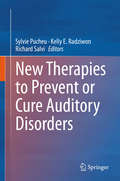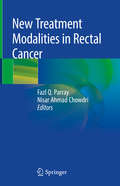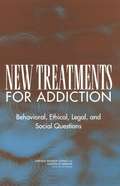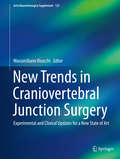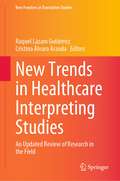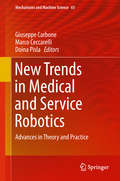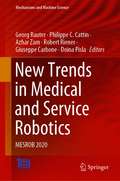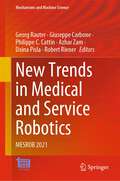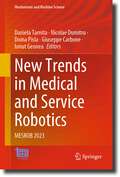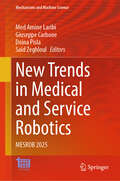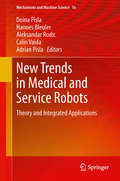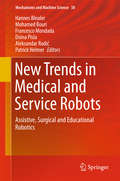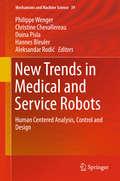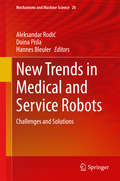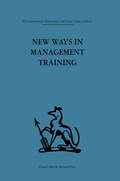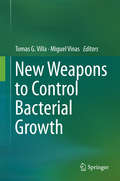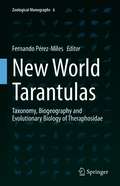- Table View
- List View
New Therapies to Prevent or Cure Auditory Disorders
by Sylvie Pucheu Kelly E. Radziwon Richard SalviHearing loss is the most common form of sensory impairment in humans, affecting 360 million persons worldwide. In parallel, tinnitus disorder, the perception of a phantom sound often described as a ringing or buzzing, affects around 10–15% of the general population and interferes with daily life. Hyperacusis, defined as a hypersensitivity to moderate-intensity sounds often co-occurs with tinnitus suggesting a common mechanism of dysfunction for these two perceptual disorders. Whereas some drug candidates are in the process of being developed, nowadays no effective treatment exists to cure hearing loss and tinnitus.The topic of this book was selected with the goal of emphasizing mechanisms that induce hearing loss and tinnitus which lead the selection of promising targets for hearing disorder treatment.Hair cells (HC) are the sensory cells of the inner ear required for both auditory and vestibular functions in all vertebrates. HC are progressively lost during ageing and they are in addition sensitive to physical and acoustic traumas, infectious diseases and chemicals present in commonly used treatments such as anticancer, antimalarial or antibiotics. As adult mammals--including humans--cannot regenerate dead HC, all the possible injury could result in irreversible and permanent hearing loss. It has been shown, however, that a limited capacity to regenerate HC exists in mouse at an early stage of development. The regenerative capacity of HC then appears simply “repressed” in adult mammals, and one could expect it will be possible to re-activate it with an appropriate therapeutic approach which is still to be defined. Immune-mediated inner ear disease has been introduced and accepted as one SNHL pathophysiology; it responds to immunosuppressive therapy and is one of the few reversible forms of bilateral SNHL. Macrophages are always present in the spiral ligament of the lateral wall and are activated in response to various types of stimuli, including noise exposure, ischemia, mitochondrial damage, and surgical stress. Recent studies have also revealed another type of immune cell, called perivascular melanocyte-like macrophages (PVM/Ms), in the stria vascularis. The book will include a review of inflammatory/immune cells in the cochlear lateral wall, the pathways involved in cochlear damage and their potential as therapeutic targets.The final chapter provides an overview of current animal model of tinnitus and hyperacusis. Nowadays no effective treatment exists to cure tinnitus and hyperacusis. One major obstacle to arises from the fact that tinnitus is a subjective phenomenon, the only possible diagnosis relies on self-reports of the subjects. The main constraint of the use of animal models is the subjective character of tinnitus. This chapter describe the advancement in animal models which play an important role in revealing the underlying mechanisms and treatment for tinnitus and hyperacusis.
New Thinking About Mental Health and Employment
by Bob Grove Jennifer Secker Patience SeebolmUntil recently it has been assumed that people who experience severe and enduring mental health problems are unable to work, unless or until they recover. That assumption is now being challenged by international research demonstrating that, with the right support, people can succeed in finding and keeping a job even when they continue to need support from mental health services. New Thinking about Mental Health and Employment draws together the research undertaken to date and combines it with mental health service users’ perspectives on the workplace to validate key points. Vital reading at both policy and practitioner levels, this book will be of great value to mental health nurses, social workers, general practitioners, psychiatrists and occupational therapists. It will also be of interest to employment advisors, government departments, commissioners, and policy makers and shapers.
New Treatment Modalities in Rectal Cancer
by Nisar Ahmad Chowdri Fazl Q. ParrayThis book provides an up-to-date and detailed overview of diagnostic and management strategies for rectal cancer.It includes chapters focusing on recent diagnostic modalities such as technical advances, the role of magnetic resonance imaging (MRI), immunology, and histopathology, as well as the latest surgical techniques for the management of rectal cancer. It also discusses the role of adjuvant, neo-adjuvant and non-operative approaches.Further, it presents the recent guidelines of prevention and early diagnosis, as well as current and future diagnostic and staging work-up, clearly and concisely, linking each topic to the therapeutic options arising from the staging. A large part of this multifaceted book is devoted to the in-hospital care of rectal cancer patients, from the fast-track procedures and enhanced recovery systems to detailed descriptions of the available surgical techniques, including salvage situations, accidents, complications and their treatment.
New Treatments for Addiction: Behavioral, Ethical, Legal, and Social Questions
by Committee on Immunotherapies Sustained-Release Formulations for Treating Drug AddictionNew and improved therapies to treat and protect against drug dependence and abuse are urgently needed. In the United States alone about 50 million people regularly smoke tobacco and another 5 million are addicted to other drugs. In a given year, millions of these individuals attempt—with or without medical assistance—to quit using drugs, though relapse remains the norm. Furthermore, each year several million teenagers start smoking and nearly as many take illicit drugs for the first time. Research is advancing on promising new means of treating drug addiction using immunotherapies and sustained-release (depot) medications. The aim of this research is to develop medications that can block or significantly attenuate the psychoactive effects of such drugs as cocaine, nicotine, heroin, phencyclidine, and methamphetamine for weeks or months at a time. This represents a fundamentally new therapeutic approach that shows promise for treating drug addiction problems that were difficult to treat in the past. Despite their potential benefits, however, several characteristics of these new methods pose distinct behavioral, ethical, legal, and social challenges that require careful scrutiny. Such issues can be considered unique aspects of safety and efficacy that are fundamentally related to the distinct nature and properties of these new types of medications.
New Trends in Craniovertebral Junction Surgery: Experimental and Clinical Updates for a New State of Art (Acta Neurochirurgica Supplement #125)
by Massimiliano VisocchiThis issue of Acta Neurochirururgica presents the latest surgical and experimental approaches to the craniovertebral junction (CVJ). It discusses anterior midline (transoral transnasal), posterior (CVJ craniectomy laminectomy, laminotomy, instrumentation and fusion), posterolateral (far lateral) and anterolateral (extreme lateral) approaches using state-of-the-art supporting tools. It especially highlights open surgery, microsurgical techniques, neuronavigation, the O-arm system, intraoperative MR, neuromonitoring and endoscopy. Endoscopy represents a useful complement to the standard microsurgical approach to the anterior CVJ: it can be used transnasally, transorally and transcervically; and it provides information for better decompression without the need for soft palate splitting, hard palate resection, or extended maxillotomy. While neuronavigation allows improved orientation in the surgical field, intraoperative fluoroscopy helps to recognize residual compression. Under normal anatomic conditions, there are virtually no surgical limitations to endoscopically assisted CVJ and this issue provides valuable information for the new generation of surgeons involved in this complex and challenging field of neurosurgery.
New Trends in Healthcare Interpreting Studies: An Updated Review of Research in the Field (New Frontiers in Translation Studies)
by Raquel Lázaro Gutiérrez Cristina Álvaro ArandaInterpreting studies have exponentially grown over the years propelled by the realities of multicultural societies which, among other factors, include constant waves of immigration and the subsequent allocation of newly arrived citizens in their host countries—a process entailing public service access and provision. Communicative interactions between users who do not speak the same language as public service providers have been largely studied in different settings belonging to the field Public Service Translation and Interpreting (PSIT), ranging from police, asylum, legal, educational or, focus of this book, healthcare contexts. This edited book offers a unique and updated insight into the research advances and the state of the art in healthcare interpreting. Contributions cover methodological innovations, together with hot topics, such as changing roles, gender, specialized contexts, training programs, and ethical codes, to name but a few.
New Trends in Macromolecular and Supramolecular Chemistry for Biological Applications
by Marc J. M. Abadie Mariana Pinteala Alexandru RotaruThis contributed volume applies the insights of supramolecular chemistry to biomedical applications such as ions/water transport through nano-scale channels, gene therapy, tissue engineering and drug delivery, to cite some of the major investigations.The challenge is to understand the mechanisms of transport through tissues particularly in the therapeutic treatment of a disease where the active drug must be delivered directly to diseased cells without affecting healthy cells. As a result, smaller quantities of active substances can be used to treat the disease. Another interest concerns new ways to administer gene therapy. If genes are often delivered to their target cells by adapted viruses, the supramolecular non-viral ‘vectors’ using dynamic nano-frameworks and nano-structures are presented. In addition, it is important to reconstruct damaged tissues by mimicking natural processes in cells and polymers, such as tissue engineering and self-healing. Different options are here discussed: e.g. hydrogels based on chitosan, a carbohydrate polymer, are proving especially promising for tissue engineering and drug delivery. For controlled delivery of drugs or other biologically active compounds, hydrogels sensitive to the most important stimuli in the human body, such as temperature, pH, ionic strength, glucose and biomolecules released by the organism in pathological conditions have been developed. Finally, to assist and validate the experimental studies, computer modelling and simulations of large-sized molecular structures and systems using different molecular dynamics and quantum mechanical techniques are developed based on the experimental and chemistry synthesis.This book is of great interest for graduate students, researchers and health professionals interested in acquiring a better understanding of the mechanisms of medical treatments. In addition, it provides numerous tools to develop better therapies for human diseases.
New Trends in Medical and Service Robotics: Advances in Theory and Practice (Mechanisms and Machine Science #65)
by Giuseppe Carbone Doina Pisla Marco CeccarelliThis book contains the selected papers of the Sixth International Workshop on Medical and Service Robots (MESROB 2018), held in Cassino, Italy, in 2018. The main topics of the workshop include: design of medical devices, kinematics and dynamics for medical robotics, exoskeletons and prostheses, anthropomorphic hands , therapeutic robots and rehabilitation, cognitive robots, humanoid and service robots, assistive robots and elderly assistance, surgical robots, human-robot interfaces, haptic devices, and medical treatments.
New Trends in Medical and Service Robotics: MESROB 2020 (Mechanisms and Machine Science #93)
by Robert Riener Giuseppe Carbone Doina Pisla Georg Rauter Philippe C. Cattin Azhar ZamThis book contains the papers of the 7th International Workshop on Medical and Service Robots (MESROB) that was planned to be held in Basel, Switzerland, in July 2020. Since the conference could not be held due to the worldwide Corona pandemic, the proceedings are published in this book and presentation of the accepted papers will be postponed to next year’s conference (MESROB 2021). The main topics of the workshop include: design of medical devices, kinematics and dynamics for medical robotics, exoskeletons and prostheses, anthropomorphic hands, therapeutic robots and rehabilitation, cognitive robots, humanoid and service robots, assistive robots and elderly assistance, surgical robots, human-robot interfaces, haptic devices, medical treatments, medical lasers, and surgical planning and navigation. The contributions, which were selected by means of a rigorous international peer-review process, highlight numerous exciting ideas that will spur novel research directions and foster multidisciplinary collaboration among different specialists, demonstrating that medical and service robotics will drive the technological and societal change in the coming decades.
New Trends in Medical and Service Robotics: MESROB 2021 (Mechanisms and Machine Science #106)
by Robert Riener Giuseppe Carbone Doina Pisla Georg Rauter Philippe C. Cattin Azhar ZamThis volume contains the papers of the 7th International Workshop on Medical and Service Robots (MESROB) which was held in Basel, Switzerland, on June 7-9, 2021. The main topics include: design of medical devices, kinematics and dynamics for medical robotics, exoskeletons and prostheses, anthropomorphic hands, therapeutic robots and rehabilitation, cognitive robots, humanoid and service robots, assistive robots and elderly assistance, surgical robots, human-robot interfaces, haptic devices, medical treatments, medical lasers, and surgical planning and navigation. The contributions, which were selected by means of a rigorous international peer-review process, highlight numerous exciting ideas that will spur novel research directions and foster multidisciplinary collaboration among different specialists, demonstrating that medical and service robotics will drive the technological and societal change in the coming decades.
New Trends in Medical and Service Robotics: MESROB 2023 (Mechanisms and Machine Science #133)
by Giuseppe Carbone Doina Pisla Daniela Tarnita Nicolae Dumitru Ionut GeoneaThis volume contains the papers of the 8th International Workshop on Medical and Service Robots (MESROB) which was held in Craiova, Romania, on June 7-10, 2023. The main topics include: design of medical devices, kinematics and dynamics for medical robotics, exoskeletons and prostheses, anthropomorphic hands, therapeutic robots and rehabilitation, cognitive robots, humanoid and service robots, assistive robots and elderly assistance, surgical robots, human-robot interfaces, haptic devices, medical treatments, medical lasers, and surgical planning and navigation. The contributions, which were selected by means of a rigorous international peer-review process, highlight numerous exciting ideas that will spur novel research directions and foster multidisciplinary collaboration among different specialists, demonstrating that medical and service robotics will drive the technological and societal change in the coming decades.
New Trends in Medical and Service Robotics: MESROB 2025 (Mechanisms and Machine Science #186)
by Giuseppe Carbone Doina Pisla Med Amine Laribi Said ZeghloulThis book contains the papers of the 9th International Workshop on Medical and Service Robots (MESROB) which was held in Poitiers, France, on July 2-4, 2025. The main topics include: design of medical devices, kinematics and dynamics for medical robotics, exoskeletons and prostheses, anthropomorphic hands, therapeutic robots and rehabilitation, cognitive robots, humanoid and service robots, assistive robots and elderly assistance, surgical robots, human–robot interfaces, haptic devices, medical treatments, medical lasers, and surgical planning and navigation. The contributions, which were selected by means of a rigorous international peer-review process, highlight numerous exciting ideas that will spur novel research directions and foster multidisciplinary collaboration among different specialists, demonstrating that medical and service robotics will drive the technological and societal change in the coming decades. Chapter "A Pneumatic HandHeld Device for Finger Active Tele-rehabilitation" is available open access under a Creative Commons Attribution-NonCommercial-NoDerivatives 4.0 International License via link.springer.com.
New Trends in Medical and Service Robots
by Doina Pisla Hannes Bleuler Aleksandar Rodic Calin Vaida Adrian PislaThis book contains mainly the selected papers of the First International Workshop on Medical and Service Robots, held in Cluj-Napoca, Romania, in 2012. The high quality of the scientific contributions is the result of a rigorous selection and improvement based on the participants' exchange of opinions and extensive peer-review. This process has led to the publishing of the present collection of 16 independent valuable contributions and points of view and not as standard symposium or conference proceedings. The addressed issues are: Computational Kinematics, Mechanism Design, Linkages and Manipulators, Mechanisms for Biomechanics, Mechanics of Robots, Control Issues for Mechanical Systems, Novel Designs, Teaching Methods, all of these being concentrated around robotic systems for medical and service applications. The results are of interest to researchers and professional practitioners as well as to Ph. D. students in the field of mechanical and electrical engineering. This volume marks the start of a subseries entitled "New Trends in Medical and Service Robots" within the Machine and Mechanism Science Series, presenting recent trends, research results and new challenges in the field of medical and service robotics.
New Trends in Medical and Service Robots
by Doina Pisla Hannes Bleuler Aleksandar Rodic Mohamed Bouri Francesco Mondada Patrick HelmerMedical and Service Robotics integrate the most recent achievements in mechanics, mechatronics, computer science, haptic and teleoperation devices together with adaptive control algorithms. The book includes topics such as surgery robotics, assist devices, rehabilitation technology, surgical instrumentation and Brain-Machine Interface (BMI) as examples for medical robotics. Autonomous cleaning, tending, logistics, surveying and rescue robots, and elderly and healthcare robots are typical examples of topics from service robotics. This is the Proceedings of the Third International Workshop on Medical and Service Robots, held in Lausanne, Switzerland in 2014. It presents an overview of current research directions and fields of interest. It is divided into three sections, namely 1) assistive and rehabilitation devices; 2) surgical robotics; and 3) educational and service robotics. Most contributions are strongly anchored on collaborations between technical and medical actors, engineers, surgeons and clinicians. Biomedical robotics and the rapidly growing service automation fields have clearly overtaken the "classical" industrial robotics and automatic control centered activity familiar to the older generation of roboticists.
New Trends in Medical and Service Robots
by Christine Chevallereau Philippe Wenger Doina Pisla Hannes Bleuler Aleksandar RodićMedical and service roboticsintegrates several disciplines and technologies such as mechanisms,mechatronics, biomechanics, humanoid robotics, exoskeletons, andanthropomorphic hands. This book presents the most recent advances in medical and servicerobotics, with a stress on human aspects. It collects the selectedpeer-reviewed papers of the Fourth International Workshop on Medical andService Robots, held in Nantes, France in 2015, covering topics on:exoskeletons, anthropomorphic hands, therapeutic robots and rehabilitation,cognitive robots, humanoid and service robots, assistive robots and elderlyassistance, surgical robots, human-robot interfaces, BMI and BCI, hapticdevices and design for medical and assistive robotics. This book offers avaluable addition to existing literature.
New Trends in Medical and Service Robots
by Doina Pisla Hannes Bleuler Aleksandar RodićThis volume describes new frontiers in medical and service robotics in the light of recent developments in technology to advance robot design and implementation. In particular, the work looks at advances in design, development and implementation of contemporary surgical, rehabilitation and biorobots. Surgical robots allow surgeons greater access to areas under operation using more precise and less invasive methods. Rehabilitation robots facilitate and support the lives of the infirm, elderly people, or those with dysfunction of body parts affecting movement. These robots are also used for rehabilitation and related procedures, such as training and therapy. Biorobots are designed to imitate the cognition of humans and animals. The need to substitute humans working on delicate, tiresome and monotonous tasks, or working with potentially health-damaging toxic materials, requires intelligent, high-performance service robots with the ability to cooperate, advanced communication and sophisticated perception and cognitive capabilities. Progress in this field is fast and results need to be disseminated to stimulate both practical applications and further research. Thus, these papers are a valuable addition to existing literature.
New Wars and Old Plagues: Armed Conflict, Environmental Change and Resurgent Malaria in the Southern Caucasus
by Katherine Hirschfeld Kirsten de Beurs Brad Brayfield Ani Melkonyan-GottschalkThis Open Access book uses Mary Kaldor’s concept of “New Wars” to explore how ethnic conflict reshaped the social and environmental landscape of the Southern Caucuses following the collapse of the Soviet Union. It relies on remote sensing data and qualitative historical research to explore how armed conflict between non-state actors generated the region’s largest epidemic of P. vivax malaria since the 1960s. This book is an important addition to the literature on the Karabakh conflict and conflict studies more broadly because the infectious disease outbreaks associated with warfare often kill more people than the armed conflicts themselves. Warfare itself has also changed dramatically since the collapse of the USSR, and the Karabakh conflict provides an excellent case study of the way “New Wars” transform the natural and social environment to facilitate outbreaks of preventable disease. This extended case study will be useful to researchers from a variety of academic disciplines, including medical anthropology, geography, conflict studies, disease ecology, global health and public health. It also reveals the fragility of twentieth century malaria control in temperate regions and will assist in predictive modeling for future outbreaks.
New Ways in Management Training: A technical college develops its services to industry
by Cyril Sofer Geoffrey HuttonTavistock Press was established as a co-operative venture between the Tavistock Institute and Routledge & Kegan Paul (RKP) in the 1950s to produce a series of major contributions across the social sciences. This volume is part of a 2001 reissue of a selection of those important works which have since gone out of print, or are difficult to locate. Published by Routledge, 112 volumes in total are being brought together under the name The International Behavioural and Social Sciences Library: Classics from the Tavistock Press. Reproduced here in facsimile, this volume was originally published in 1958 and is available individually. The collection is also available in a number of themed mini-sets of between 5 and 13 volumes, or as a complete collection.
New Ways in Psychoanalysis (International Library Of Psychology Ser.)
by Horney, KarenFirst Published in 1999. Routledge is an imprint of Taylor & Francis, an informa company.
New Weapons to Control Bacterial Growth
by Tomas G. Villa Miguel VinasWritten by specialists in the different fields, this book presents new perspectives and insights into strategies and weapons to fight microbial infections. It also reviews the "state of the art" of alternative treatment approaches and new therapeutic agents to deal with infections caused by multidrug-resistant microorganisms. In an era of accumulated resistance to current antibiotics, it is vital that this is undertaken without further delay. Aspects discussed include the control of RNA synthesis, the use of bacteriocins or enzybiotics (bacteriophages or purified lysins), the specific control of pathogenic clostridia, the design of new drugs affecting DNA synthesis in bacteria, the use of fecal-matter transplant strategies, the specific control of quorum sensing responses in bacteria, the use of new peptides as antibiotics and new ways to control bacteria that cause cancer, such as Helicobacter pylori cancers.
New Work im Krankenhaus: Shared Governance in der Pflegepraxis
by Julia Mayer Andrea Ellermeyer Laura Gerken Maria KitzmantelInnovation und Entwicklung als Erfolgsfaktor in der Pflege! Der Wandel der Arbeitswelt zeigt sich auch im Krankenhaus mit einer starken Dynamik. Dieses Buch inspiriert und motiviert Pflegende in den Bereichen Pflegemanagement, -wissenschaft, -pädagogik und Qualitätsmanagement Führungsmodelle neu zu denken und umzusetzen. Die Ideen von New Work und Shared Governance erfordern für eine neue Arbeits- und Teamkultur eine entsprechende Haltung. Pflegefachpersonen sind mehr denn je gefordert, ihre Erfahrung und Expertise einzubringen und Versorgungsprozesse aktiv zu gestalten. Karrierewege werden geöffnet und die Attraktivität für dringend benötigtes Pflegepersonal steigt, wenn spannende Entwicklungsmöglichkeiten in der Pflege wahrgenommen und gefördert werden. Das erfahrene Herausgeberinnenteam stellte sich gemeinsam den Herausforderungen einer sich verändernden Arbeitswelt, identifizierte neue Möglichkeiten und Perspektiven für den Erfolg, erlebte die positiven Auswirkungen einer neuen Führungskultur und -haltung selbst und evaluierte die Ansätze.
New World Tarantulas: Taxonomy, Biogeography and Evolutionary Biology of Theraphosidae (Zoological Monographs #6)
by Fernando Pérez-MilesThe Theraphosidae are the most famous and diverse mygalomorph spiders, and include some of the largest arachnids on earth. Their unique defense mechanisms, predatory tactics, reproductive strategies and ecological adaptations are displayed by a wide range of terrestrial, burrowing and arboreal species. These arachnids are familiar to the general public thanks to horror movies and a growing interest in tarantulas as pets; however, scientific information on the group is scattered throughout the literature and not easily available. This book reviews all major aspects of New World Theraphosid tarantulas and provides in-depth information on their evolution, taxonomy, behavior, physiology, ecology, reproduction, conservation and biogeography. As a comprehensive guide to the biology of tarantulas, it will appeal to researchers, students and terrarium hobbyists alike.
New Year Wedding for the Crown Prince
by Meredith WebberCan the charming prince Claim his gorgeous bride?When Crown Prince Charles of Livaroche turns up on Dr. Jo Wainright’s Australian doorstep, their two worlds collide. Only while Charles is seeking clues to his past, Jo is determined to forget the heartbreak of hers. Stranded together this Christmas their magical connection becomes hard to ignore… But when Charles proposes, dare Jo reveal the reason that’s standing in her way of becoming his New Year bride?“The way this story ended had me cheering for this couple’s happy ever after because the plot twist made it palpable these two are meant to be. I would recommend…if you enjoy the fake relationship trope or a story where the hero and heroine are meant to be.” Harlequin Junkie on A Forever Family for the Army Doc“From the beginning of this book I was hooked, I loved every minute of it…. It is a fascinating book set in paradise which I thoroughly enjoyed.” Goodreads on A Miracle for the Baby Doctor
New York After 9/11
by Susan Opotow and Zachary Baron Shemtob, editorsAn estimated 2 billion people around the world watched the catastrophic destruction of the World Trade Center. The enormity of the moment was immediately understood and quickly took on global proportions. What has been less obvious is the effect on the locus of the attacks, New York City, not as a seat of political or economic power, but as a community; not in the days and weeks afterward, but over months and years. New York after 9/11 offers insightful and critical observations about the processes set in motion by September 11, 2001 in New York, and holds important lessons for the future. This interdisciplinary collection brings together experts from diverse fields to discuss the long-term recovery of New York City after 9/11. Susan Opotow and Zachary Baron Shemtob invited experts in architecture and design, medicine, health, community advocacy, psychology, public safety, human rights, law, and mental health to look back on the aftereffects of that tragic day in key spheres of life in New York City. With a focus on the themes of space and memory, public health and public safety, trauma and conflict, and politics and social change, this comprehensive account of how 9/11 changed New York sets out to answer three questions: What were the key conflicts that erupted in New York City in 9/11’s wake? What clashing interests were involved and how did they change over time? And what was the role of these conflicts in the transition from trauma to recovery for New York City as a whole?Contributors discuss a variety of issues that emerged in this tragedy’s wake, some immediately and others in the years that followed, including: PTSD among first responders; conflicts and design challenges of rebuilding the World Trade Center site, the memorial, and the museum; surveillance of Muslim communities; power struggles among public safety agencies; the development of technologies for faster building evacuations; and the emergence of chronic illnesses and fatalities among first responders and people who lived, worked, and attended school in the vicinity of the 9/11 site. A chapter on two Ground Zeros –in Hiroshima and New York – compares and historicizes the challenges of memorialization and recovery. Each chapter offers a nuanced, vivid, and behind-the-scenes account of issues as they unfolded over time and across various contexts, dispelling simplistic narratives of this extended and complicated period. Illuminating a city’s multifaceted response in the wake of a catastrophic and traumatic attack, New York after 9/11 illustrates recovery as a process that is complex, multivalent, and ongoing.
New York Doc, Thailand Proposal: New York Doc, Thailand Proposal / The Surgeon's Baby Bombshell (Mills And Boon Medical Ser.)
by Dianne DrakeWorlds apart...But reunited by love!Surgeons Layla and Arlo once shared a connection like no other, but they’re total opposites: Layla’s heart belongs to New York, while Arlo won’t ever work in a big city hospital. Only when Arlo’s remote practice needs her help, Layla finds herself heading out to Thailand! Working side-by-side, Layla begins to see jungle life through Arlo’s eyes… Is a proposal in paradise enough to give life together a second chance?“Overall, Ms. Drake has delivered a wonderful and very heartfelt read in this book where the chemistry between this couple was just as strong in the present as it was in the past; the romance was delightful and special because these two are meant to be….”— Harlequin Junkie on Second Chance with Her Army Doc“The way this story started drew me in immediately…the characters progressed brilliantly and had me really enjoying their journey to happy ever after….”— Harlequin Junkie on Bachelor Doc, Unexpected Dad
